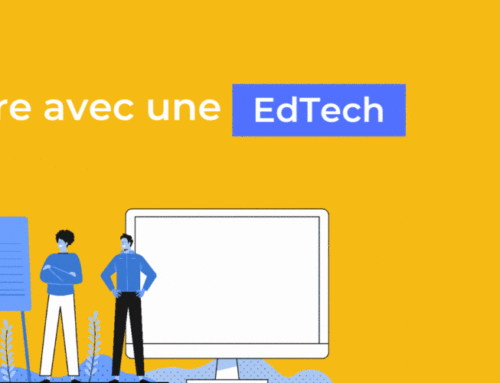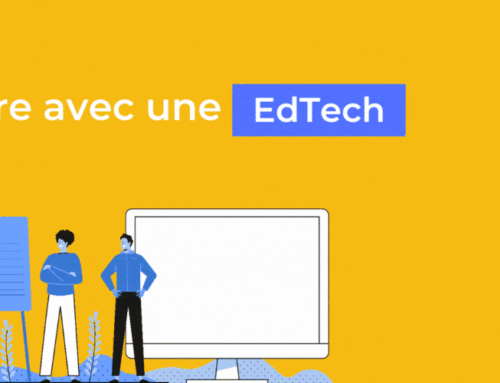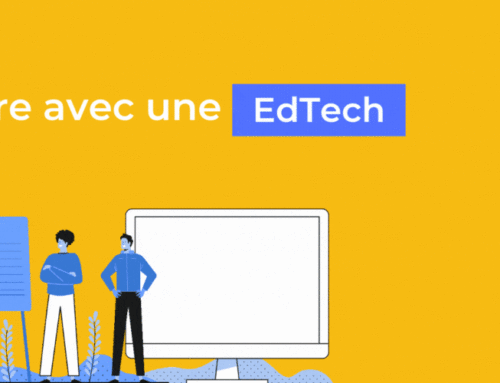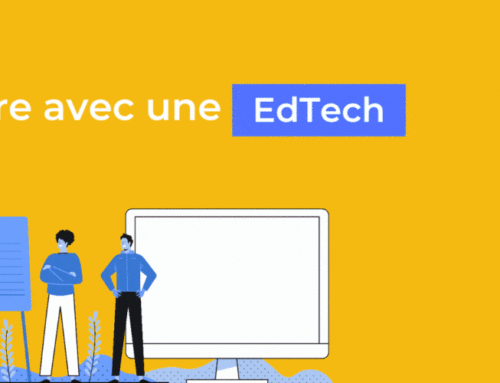
Zoé Broisson
Co-founder and CEO of Flowchase
An English language learning application that improves professional speaking skills, Flowchase is an easy-to-use platform that offers general English courses and industry-specific soft skills to help learners succeed.
Tech is often perceived as a masculine world. You co-founded and now run an EdTech company. Has being a woman been an advantage ?
Tech isn’t perceived as a masculine universe, it is. That’s not my opinion, it’s a fact. As far as EdTech is concerned, you only have to read the report published in January 2023 by the European EdTech Alliance¹ to realize this: only 12.8% of European EdTechs are founded by women, while 42.9% are founded by men and 44.7% by a mixed team, like Flowchase.
This gender gap becomes alarming when we look at my direct colleagues: 73.9% of EdTech CEOs are men, and they benefit from the vast majority of funds invested in our industry. This reflects the general state of Tech in Europe², although female founders generate a higher return³.
But given that the investment itself comes from predominantly male business angels and funds with teams lacking in diversity, is this situation surprising ? Not really.
Aside from a concern for equity, which alone should motivate change, the following observation supports it in my view: women represent the majority of teachers (up to 75% in schools4), and consequently a significant proportion of our users. What gender bias are we allowing to influence the products they use?
To sum up: has being a woman been an advantage for me ? No. Should it be ? No. Nor should it. My gender should be neither an advantage nor another obstacle in my journey. But for this to become a reality, we all still have work to do.
Flowchase is an application designed to improve pronunciation when learning English. How is your solution used by teachers and students ?
Exactly. Flowchase is a spin-off from a Belgian university research project (at UCLouvain). Our learning experience has therefore been designed by applying research in linguistics and pedagogy, following a model known as the “flipped classroom”.
This is a tried-and-tested learning method for teaching with digital tools such as Flowchase, which deliver tenfold learning results thanks to the unlimited personalization and practice offered by artificial intelligence as a complement to training. This integrated digital approach makes perfect sense when teaching highly individual skills such as pronunciation and oral expression, where differentiated learning is necessary but difficult to implement effectively with human resources alone.
In practical terms, our mobile app comes with a manual of ready-to-use group activities, and our programs are designed to integrate seamlessly with teacher-led courses. Teachers can ask their students to familiarize themselves with the concepts of oral expression at home, before coming to class. This is done by completing quizzes, listening activities and practicing speaking in the app. When we record ourselves, the AI we’ve developed analyzes our voice, detects our mistakes and then gives personalized advice on how to improve. This first step is crucial, as it allows each learner to go at his or her own pace, and to train in his or her own comfort zone, away from the judgment of others that usually holds back the shyest.
Une fois en cours, les enseignant·es utilisent le manuel Flowchase pour mettre les compétences nouvellement acquises en pratique grâce aux activités correspondantes. Cette approche permet non seulement de gagner du temps de classe en ne devant pas expliquer la matière nouvelle et en passant directement à la pratique orale, mais elle permet également d’engager une utilisation systématique et régulière de l’outil par les étudiants·es, et de consolider les connaissances obtenues en multipliant les interactions productives avec la matière.
You currently work with a number of schools, both secondary and university. What are your plans for 2023 ?
For the moment, we’ve been working mainly with higher education in France, Belgium and Spain. This is where we have the greatest impact, training future graduates just before they enter the job market, where the language skills we provide will be an undisputed asset.
In 2023, at the request of our customers, we plan to expand our portfolio of learning paths to help our learners train with the most relevant content for their discipline. This includes, for example, the development of courses on soft skills (“How to give an excellent job interview”) or with specialized vocabulary (such as medical English, for example).
We’re also building on our momentum in higher education, and aiming to consolidate our presence in our partners’ countries as well as in other European countries such as the UK, where we’re setting up a program for the many international students preparing to study in English.
But you’re right: the secondary education sector has shown increasing interest in our solution from the outset, and we’re just starting to collaborate. We have just launched a pilot project involving 25 schools in France and Belgium, where the effectiveness of our tool in this context will be evaluated by Marie Dea, a pedagogy researcher from the University of Mons. If we’re going to revolutionize language training, we might as well start as early as possible!
¹ European EdTech Alliance. The European EdTech Map : Insights Report (January 2023)
² https://pitchbook.com/news/articles/senior-female-vcs-call-out-major-funding-disparity-in-europe
³ https://www.bcg.com/publications/2018/why-women-owned-startups-are-better-bet
4 https://www.holoniq.com/notes/the-2022-global-state-of-womens-leadership
Want to discover a new EdTech interview every month? All you have to do is subscribe to our newsletter, which will bring you Des Nouvelles de Simone !!






